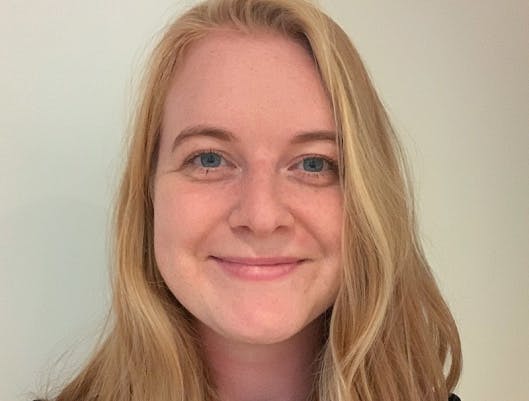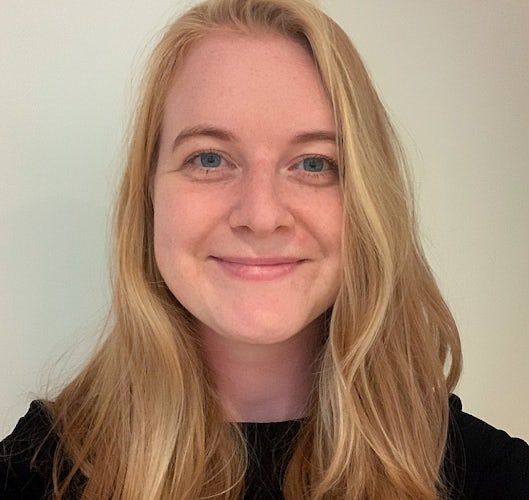Pollen8 is an innovation agency that works with organisations on strategy, technology, and transformational change. We recently chatted with Sophie Cavanagh, Pollen8’s Director of Consulting, to find out how the pandemic is impacting life at the company. Here’s what she had to say…
Please describe your job: What do you do?
I’m the Director of Consulting at Pollen8, a platform-enabled innovation consultancy based in Hackney. We help large organisations such as Vodafone, PwC and The British Red Cross to structure their internal innovation efforts and harness the power of their talent. We provide consulting expertise alongside a SaaS platform where our customers can run innovation programmes, gathering ideas from their employees. From here they can manage their innovation portfolios with ease.
With my team and our clients, I work to define innovation strategies. I set up and run innovation programmes, and support the incubation and development of brilliant ideas that are surfaced through these programmes.
Talk us through a typical day…
Starting with the cliched response every consultant would say to this question – there’s no such thing as a typical day. It always depends on the stage of the projects we’re working on, the key meetings and workshops we’re hosting that week, and the specific challenges or opportunities that have presented themselves and demand the most attention.
A day could involve collaborating with a client to iron out the final details of their innovation challenge and get the platform set up for launch. I might be facilitating a virtual innovation Sprint (making the most of powerful virtual collaboration tools like Miro and good old Zoom) for a client team working on a juicy problem they’ve identified. Or I could be running a webinar event on how we can drive the participation of women in innovation (something close to my heart).
How do you maintain an effective work/life balance?
I don’t believe work and life are two separate things. Work is a huge part of most people’s lives. The key to maintaining a sense of balance is making work a positive, fulfilling, productive part of your life, not something that drains you or dominates too heavily.
And of course, since the start of the pandemic, it’s been more important than ever to create boundaries that stop work becoming dominating and draining. This is especially true when we’re lacking the routine of the commute to bookend the day, and when home and the office have become the same place.
For me, it’s been about creating new routines that allow me to stay productive and positive. This might be going for a run at some point in the working day to clear my head (often that’s the best time for me to think through a sticky problem), or more proactively seeking out podcasts, articles and virtual events that give me new perspectives on my work and that challenge the way I see the world. This is helping – to some extent – compensate for the real-life events that just aren’t happening right now. I’ve been missing serendipitous conversations with my colleagues and clients, where I would get introduced to fresh ideas and new ways of thinking.
How has customer behaviour (or your clients’ customer behaviour) changed during the pandemic?
Our customers are corporate organisations looking to harness the potential of their people to solve their most important problems. Over the course of the pandemic, our customers (similarly to ourselves at Pollen8) have shifted from a focus on reacting to the crisis, to a focus on responding in a more sustainable way, to build towards a stronger and more resilient future.
At the start of the pandemic, we helped some of our clients run innovation programmes to uncover newly emerged problems. These were problems they needed to solve immediately for their people and their customers in the face of rapid change.
Now, we’re working more on programmes centred around how organisations can optimise their ways of working and refine their offering. We’re designing out inefficiencies that drain time and money, and putting in place programmes that will support more transformational opportunities. Such programmes can enable organisations to set themselves up for a future where they are more resilient and more relevant than ever.
What do you predict for the future?
More flexibility in how we work from now onward. There’s always going to be a time and a place for in-person work, and it’s so important for so many reasons, but this pandemic has taught us what can be achieved remotely. Most companies will be making a shift to greater flexibility in how and where people can work – a trend that was in place before 2020 but has been greatly accelerated!
What advice would you give a marketer right now?
Be more human. In many ways, 2020 has broken the ‘fourth wall’ when it comes to how businesses operate. The facade of relentless professionalism has fallen, the lingering idea that there’s limited space for emotion and personal experiences has been shattered, and that’s a great thing. From families popping up in Zoom calls to reinforce that people have lives beyond their work, to people being openly vulnerable about how pandemic life has impacted them – what we’ve all experienced in the past year has blurred the lines between what is professional and what is personal.
Ultimately, good business is about solving the problems that matter to people, and that make people’s lives easier, better, and more fulfilling. Marketing that speaks to people on a human level, and that drives home how solutions can improve their experience of work and life, will resonate more than ever.
Effective Remote Working for Marketers Best Practice Guide








